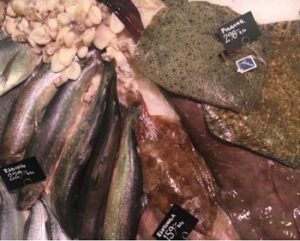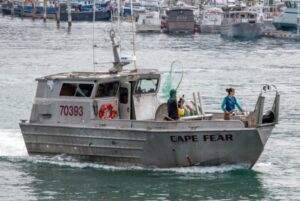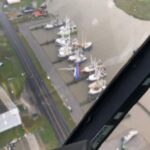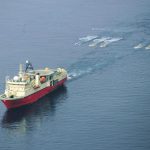Tag Archives: Dalhousie University
Climate change makes winners and losers out of cod and snow crab, says scientist
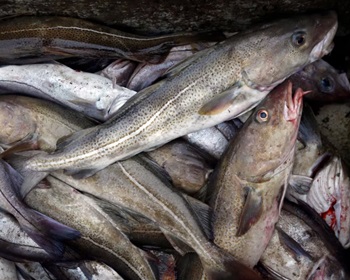 A team of scientists used modelling to look into the effects of climate change on three Grand Banks fish species. They anticipate that warmer waters could lead to biomass declines for snow crab and yellowtail flounder but gains for Atlantic cod. “That’s one thing that we see when we’re looking at the impacts of climate change on marine ecosystems and oceans, is that there are winners and losers. So it’s not as though everything is going to be negatively impacted,” said Tyler Eddy, a scientist with Marine Institute’s Centre for Fisheries Ecosystems Research. Species that thrive or struggle in these scenarios will depend on their thermal preferences and changes in a region, he said, adding a specific species might also leave a region to follow their preferred temperature. more, >>CLICK TO READ<< 10:06
A team of scientists used modelling to look into the effects of climate change on three Grand Banks fish species. They anticipate that warmer waters could lead to biomass declines for snow crab and yellowtail flounder but gains for Atlantic cod. “That’s one thing that we see when we’re looking at the impacts of climate change on marine ecosystems and oceans, is that there are winners and losers. So it’s not as though everything is going to be negatively impacted,” said Tyler Eddy, a scientist with Marine Institute’s Centre for Fisheries Ecosystems Research. Species that thrive or struggle in these scenarios will depend on their thermal preferences and changes in a region, he said, adding a specific species might also leave a region to follow their preferred temperature. more, >>CLICK TO READ<< 10:06
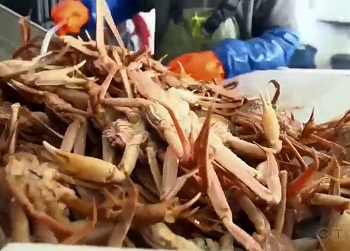
Lobster and snow crab markets fall by as much as 65 per cent
While lobster and snow crab have long been two of the Maritimes’ most popular exports, new data suggests the markets are now falling short. At the wharf in Glace Bay, N.S., fishermen were getting about $7 a pound for lobster by season’s end and about $6 for snow crab. “It wasn’t a good year, lobster-wise or crab-wise for us,” said fishermen’s representative Herb Nash. At Louisbourg Seafoods, where lobster and snow crab have long been their biggest sellers, a record year last year gave way to a difficult 2022. “We were very optimistic coming into 2022 that we would see a replica of 2021, and that couldn’t have been further from what happened,” said Allan MacLean, a senior operations manager at the seafood business. Video, >click to read< 11:38

Jeffrey Hutchings, advocate for independent fisheries science, dies at age 63
A Canadian ecologist and fisheries scientist who criticized political interference in scientific advice on declining fish populations, particularly the northern cod, has died at the age of 63. Colleagues at Dalhousie University’s department of biology said Jeffrey Hutchings, a longtime professor at the Halifax school, died at his home during the weekend. The cause of death was not released. >click to read< 19:22
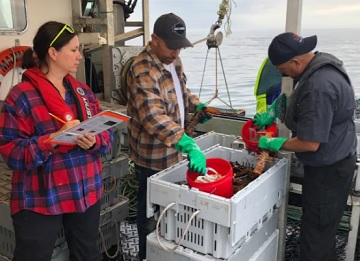
Sipekne’katik First Nation’s lobster study to assess impact of summer and fall fishing
The boat, Mamma Ain’t Happy, is owned by Sipekne’katik First Nation and is fishing under food, social, and ceremonial (FSC) tags. The tags are the licence under which the lobster can legally be fished and allow the band to harvest it for those purposes but not to sell it. After each trip, the catch is brought back to the community for lobster giveaways that feed most of the families in the second-largest Mi’kmaw band in Nova Scotia. But this boat doesn’t just fish for people’s supper. It’s also a data collection site for a study on lobster conservation. >click to read< 13:48
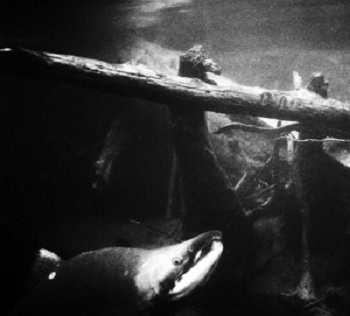
A virus that flourishes in fish farms is now threatening wild populations.
Wild salmon in British Columbia are in trouble. According to one estimate, some populations have dropped by as much as 93 percent since the early 1990s. Lately, the situation has grown dire.,, Last year, the number of sockeye returning to spawn in the Fraser River crashed to a record low. It’s hard to say exactly why this is happening, though logging, climate change, and overfishing all seem to play a role. Among the most controversial potential factors, however, is the virus Piscine orthoreovirus, or PRV. The virus isn’t necessarily fatal, but infected fish may be weakened and unable to swim as fast, making them more likely to be eaten by predators or fail to migrate upriver in order to spawn,,, Not everyone agrees. Among the dissenters is Fisheries and Oceans Canada-DFO,,, >click to read< Killing Sea Lions to Save the Salmon, February 1,1925, Dorothy G. Bell, >click to read< 19:39
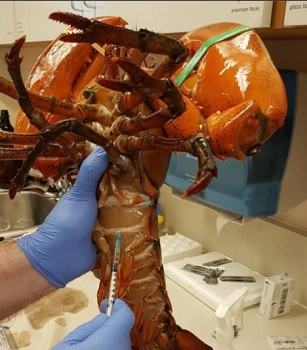
The lobster genome map – ‘It’s an encyclopedia on how to make a lobster’
Lobster already live in a variety of different habitats around Atlantic Canada, from the relatively warm waters of the Northumberland Strait through progressively warmer waters on P.E.I.’s North Shore, the east coast of Nova Scotia, and the Bay of Fundy. “We want to really understand how that temperature stress is going to impact different stages of lobster, and if that’s going to be the same impact in different areas of Atlantic Canada,” >click to read< 09:24
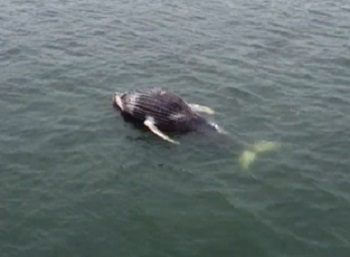
Slowing down big ships not enough to protect right whales from fatal strikes
Current speed restrictions for ships moving through Canadian waters will not prevent North Atlantic right whales from being killed if struck, according to new research that also determined smaller vessels are capable of deadly impacts. “Slowing big ships down does not reduce the death rate as much as we hoped it would,” said Brillant, adding that larger ships obeying current speed restrictions in the Gulf of St. Lawrence, where many right whales feed in the summer, still have an 80 per cent chance of killing a whale if one is struck. >click to read< 08:57
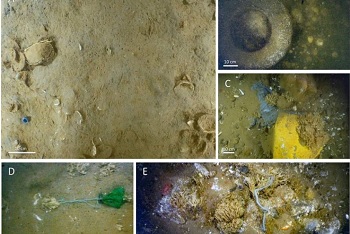
Video survey says Bay of Fundy bottom littered with plastic
A video survey of the Bay of Fundy bottom turned up some odd objects but by far the most common sight was plastic, particularly bags, said researcher Tony Walker, a professor at Dalhousie University’s school for resource and environmental studies. Video, click to read< 1.8 million pieces of garbage litter bottom of Bay of Fundy, says study – >click to read< 08:01

A fish tag that knows it’s been eaten is helping endangered Atlantic salmon
New tracking devices inserted into Atlantic salmon reveal that up to 48 per cent of the critically endangered fish are being eaten while leaving Nova Scotia’s Stewiacke River on their ocean migration. The insight is the result of acoustic tags that can tell when a tagged fish has been eaten.,, Striped bass the main predator,,, One thing has not changed: Atlantic salmon remain in deep trouble in the inner Bay of Fundy rivers where they are wiped out or on the brink of extinction. >click to read< 10:13
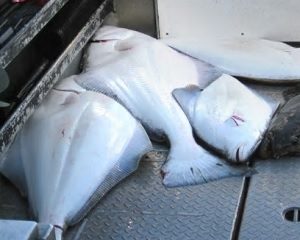
Review of Atlantic halibut survey raises sustainability questions
For more than two decades, Atlantic halibut fishermen have baited their hooks and dropped them to the ocean bottom off Nova Scotia and Newfoundland as part of a collaboration between the fishing industry and the Department of Fisheries and Oceans. The annual May to July halibut longline survey is used to predict halibut abundance in a thriving fishery worth $60 million. Dalhousie University biology student Isabelle Hurley wanted to know if the data told another story. She looked at what else was caught — so-called bycatch — in the survey between 1998 and 2016. >click to read<10:32
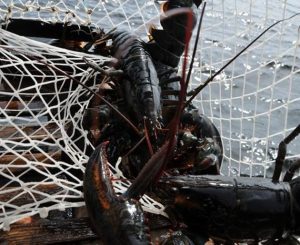
Science journal article disputes claims that aquaculture is a sustainable industry
Inka Milewski, a research associate in the Department of Biology at Dalhousie University, said Monday her conclusions are partly based on a series of long-term studies of a fish farm in Port Mouton Bay, N.S. She says evidence of an impact on lobster populations and eelgrass in the bay around those pens run counter to a “narrative” found on various federal Fisheries websites that Ottawa manages the industry in “a sustainable way.” Her report notes that Ottawa had collected reports of 14.4 metric tonnes of antibiotics and 439 metric tonnes of hydrogen peroxide pesticides being placed in the waters since federal aquaculture regulations came into force four years ago. >click to read<17:51
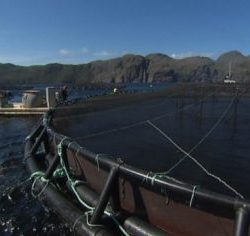
Near Fish Farms, Lobster Catches Plummet
Lobster fishers catch fewer market-sized lobsters, and see fewer fertile females, in areas close to fish farms in Nova Scotia, according to new research led by Inka Milewski, a research associate at Dalhousie University in Halifax. Lobster fishers working in Port Mouton Bay, Nova Scotia, keep detailed records of when and where they fish and how many lobsters they catch. By analyzing 11 years of fishers’ records, Milewski and her colleagues found that the reduction in catch was greatest in the areas closest to open-net-pen aquaculture sites and lowest in the areas farthest away. On average, the scientists calculated a 42 percent drop in the lobster catch and a 56 percent drop in observed egg-bearing females in years when the fish farms were active in the bay. >click to read<11:20
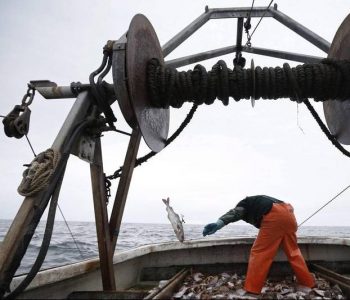
MPA’s: Trawlers allowed to fish in E.U. marine (un)protected areas – “We were surprised to find this,” said Boris Worm
Marine Protected Areas appear to not be particularly protected. At least not around Europe. A study released Thursday in the journal Science found that trawling efforts were about 36 per cent higher inside European Union Marine Protected Areas than it was outside of them. It also found that abundance of species often caught as bycatch in trawls, like sharks, skates and rays, was lower inside the heavily fished marine protected areas than outside. “We were surprised to find this,” said Boris Worm, a Dalhousie University marine ecologist who was also a senior author of the study. >click to read<19:45

Scientists and fishermen team up to help save North Atlantic right whale
Whale researchers and fishermen are out at sea together on a two-week mission, combining efforts to help save the endangered north Atlantic right whale. These two worlds have usually stayed far apart, but for the first time scientists are onboard a crab boat to do their field work. Crab fisherman Martin Noel, captain of the Jean-Denis Noel boat in Shippagan, agreed to take scientists out in the gulf to help them carry out their research this year. “We don’t want to be called whale killers,” Noel said. “We want to be called fishermen that are implicated in the solution.” All season, fishermen begged Ottawa to involve them in fisheries management. They felt the federal government was imposing overly strict measures without consultation with industry. >click to read<09:28
Boris Worm The Jellyfish Guy says New York turns into some kind of modern Venice with Sea Level Rise
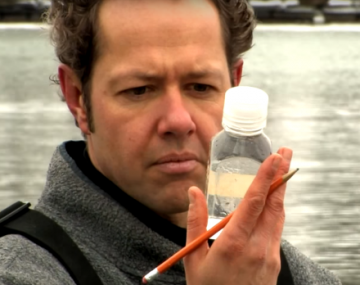 Coastal communities, including those in Newfoundland and Labrador, could be drowned by significant sea level rise before the end of the century according to a new report released by the U.S. government (NOAA). Boris Worm, a marine scientist at Dalhousie University in Halifax, N.S., says a report by the American National Oceanic and Atmospheric Administration suggests sea levels could rise by 2.5 metres by the year 2100. “They were asking the question, how will any given amount of sea level rise be felt in the U.S. and what are the likely scenarios for sea level rise given current emissions,” he told CBC Radio’s The Broadcast. “They’ve come up with a range of projections, and the notable thing here is that that range of projections is a lot larger than it used to be.” Worm said less than a decade ago, the expectation was between one and two feet of sea level rise by the end of the century. “They’ve now corrected this and said it’s going to be a lot more, and it could be up to 8.2 feet,” he said. “If that comes true, it means New York turns into some kind of modern Venice, Venice turns to some kind of Atlantis, and I don’t know what it means for Newfoundland … it really means a complete rethinking of how we live close to the coast.” Read the story here 13:45
Coastal communities, including those in Newfoundland and Labrador, could be drowned by significant sea level rise before the end of the century according to a new report released by the U.S. government (NOAA). Boris Worm, a marine scientist at Dalhousie University in Halifax, N.S., says a report by the American National Oceanic and Atmospheric Administration suggests sea levels could rise by 2.5 metres by the year 2100. “They were asking the question, how will any given amount of sea level rise be felt in the U.S. and what are the likely scenarios for sea level rise given current emissions,” he told CBC Radio’s The Broadcast. “They’ve come up with a range of projections, and the notable thing here is that that range of projections is a lot larger than it used to be.” Worm said less than a decade ago, the expectation was between one and two feet of sea level rise by the end of the century. “They’ve now corrected this and said it’s going to be a lot more, and it could be up to 8.2 feet,” he said. “If that comes true, it means New York turns into some kind of modern Venice, Venice turns to some kind of Atlantis, and I don’t know what it means for Newfoundland … it really means a complete rethinking of how we live close to the coast.” Read the story here 13:45
Canadian Perspective on Atlantic Cod Stocks & Management
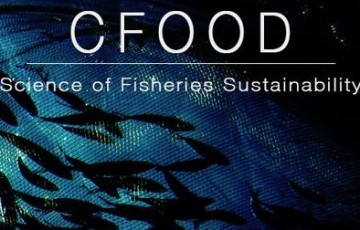 Last week we released a two part feature on the status of Atlantic cod stocks. Click here Part 1 was a general overview of the status of stocks while Part 2 dove deeper into the reasons behind different statuses.
Last week we released a two part feature on the status of Atlantic cod stocks. Click here Part 1 was a general overview of the status of stocks while Part 2 dove deeper into the reasons behind different statuses.
Jeffrey Hutchings, a fishery scientist at Dalhousie University was inspired to comment on our CFOOD feature below;
Despite voluminous research, science discussions of Atlantic cod can verge on the simplistic. Overfishing and ‘the environment’ unhelpfully portrayed as alternative or additive causes of decline. Temperature presented unequivocally as the driver of recruitment. Variable attention to how differential responses to natural and human-induced environmental stressors can be influenced by basic elements of demography — population size, age structure, natural mortality — especially when these fall outside a population’s norm. The collapse of Northern cod was unprecedented but the low temperatures that cod experienced prior to collapse were not (it has been as cold, or colder, if one’s temporal horizon extends beyond the mid 20th Century for this 500-year-old fishery). Recruitment failure is not affecting the recovery of some depleted stocks, such as Southern Gulf of St. Lawrence cod, but altered predator-prey interactions – predicated by prolonged overfishing – almost certainly are. Not all northeast Atlantic cod are doing well, as the current status of those along the Norwegian coast will attest. Read the rest here 14:07
Shark researchers question DFO policy on catch-and-kill derbies
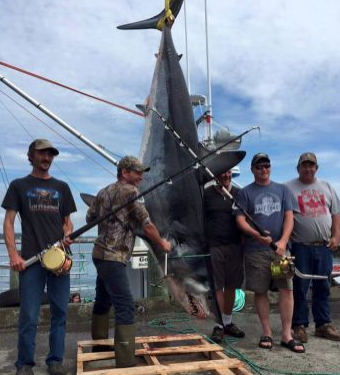 The catching of a large female mako shark has prompted some researchers to question the Fisheries and Oceans Canada policy on Nova Scotia’s annual shark derbies. The shark derbies are annual community festivals that include a shark-fishing event. Fishermen compete to catch large sharks, which are then turned over to the Department of Fisheries and Oceans so scientists can gather biological data. Sharks smaller than 2.4 metres are tagged and released. Brendal Townsend, a shark researcher at Dalhousie University, says she is concerned that the data collected is no longer scientifically useful. She believes the same information could be gathered through catch-and-release methods. Read the rest here 10:13
The catching of a large female mako shark has prompted some researchers to question the Fisheries and Oceans Canada policy on Nova Scotia’s annual shark derbies. The shark derbies are annual community festivals that include a shark-fishing event. Fishermen compete to catch large sharks, which are then turned over to the Department of Fisheries and Oceans so scientists can gather biological data. Sharks smaller than 2.4 metres are tagged and released. Brendal Townsend, a shark researcher at Dalhousie University, says she is concerned that the data collected is no longer scientifically useful. She believes the same information could be gathered through catch-and-release methods. Read the rest here 10:13
Torpedo ray tagged by Dalhousie University researchers
 Researchers from Dalhousie University in Halifax are hoping technology will help them learn more about some underwater giants living off the East Coast. What makes this ray somewhat unusual from its relatives is its powerful electric organs, visible as large, kidney-shaped patches on the side of its head that can put out a shock of about 200 volts. “It uses that to stun prey, knock it out and then it swallows them whole,” Read the rest here 07:56
Researchers from Dalhousie University in Halifax are hoping technology will help them learn more about some underwater giants living off the East Coast. What makes this ray somewhat unusual from its relatives is its powerful electric organs, visible as large, kidney-shaped patches on the side of its head that can put out a shock of about 200 volts. “It uses that to stun prey, knock it out and then it swallows them whole,” Read the rest here 07:56
Two variations so far – “Canada’s cod, and many other depleted fish, unlikely to recover” and “Study offers bleak outlook for fish recovery”
By Margaret Munro, Postmedia News – Canada’s once bountiful cod stocks are not likely to bounce back, according to an international study on the dangers of overfishing. “Here we are more than 20 years after the cod was effectively depleted, and according to our analysis, the recovery of the cod stocks is highly improbable,” says fisheries scientist Jeffrey Hutchings at Dalhousie University, co-author of the study published in the journal Science on Thursday….at the end of the article: “Ecosystems change,” says Hutchings, noting how seals, herring and mackerel now fill some of the gaps left by Canada’s cod collapse. (which part does he not understand?) contined
Aly Thomson, The Canadian Press HALIFAX – The recovery of overexploited fish populations such as cod has been slower than expected and many depleted stocks may never be able to bounce back, a new study says. continued
It would be great if our Canadian friends would leave comments about this. BH
1 comment






